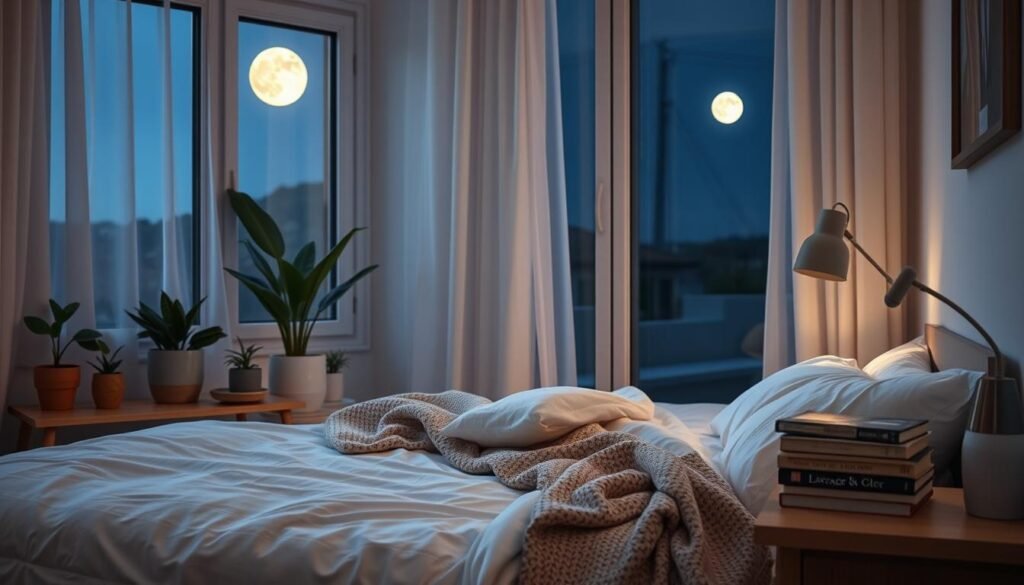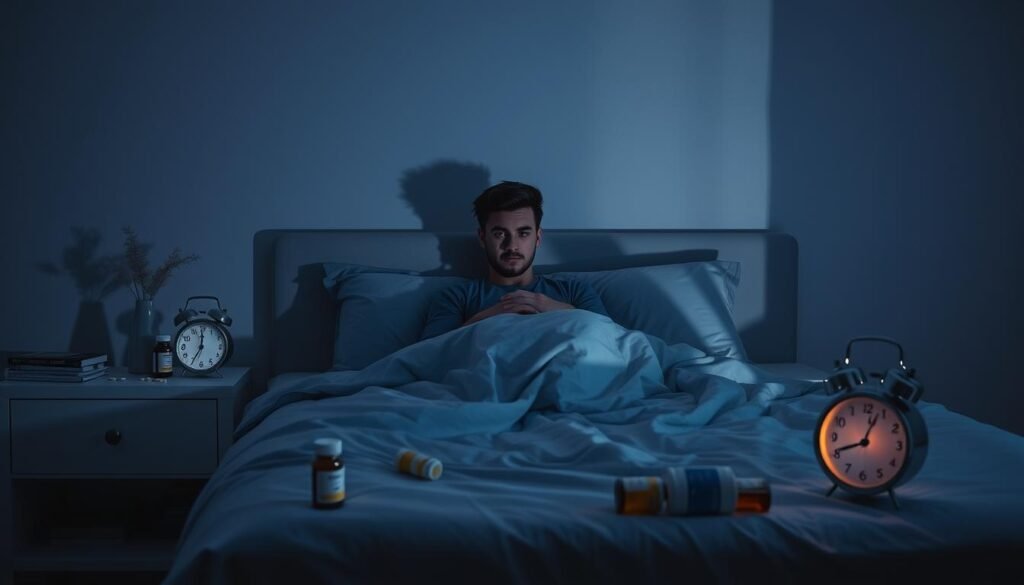Did you know up to 21% of people taking Zoloft deal with insomnia? This side effect is more than a small problem. It’s a big issue for many, affecting about 70% of Americans yearly. When taking Zoloft for depression or anxiety, understanding its impact on sleep is key. This article will dive into how Zoloft can cause sleep problems. We’ll also share tips on managing insomnia caused by Zoloft. By learning about the medication, its side effects, and ways to get better sleep, you can improve your sleep quality.
Key Takeaways
- Insomnia affects up to 21% of Zoloft users, highlighting the need for effective sleep management strategies.
- Regular exercise has been shown to improve sleep quality, potentially mitigating insomnia caused by Zoloft.
- Good sleep hygiene practices, such as establishing a consistent sleep schedule, can be beneficial for those affected.
- Individuals may need to consult a healthcare provider to discuss dosage adjustments or medication alternatives.
- Natural remedies, such as cognitive behavioral therapy and melatonin, can also provide relief from zoloft-induced insomnia.
Understanding Zoloft and Its Purpose
Zoloft, or sertraline, is an antidepressant approved by the US FDA in 1991. It helps with many mental health issues. These include major depressive disorder, panic, and obsessive-compulsive disorder, among others. Zoloft increases serotonin in the brain. This boosts mood and lowers anxiety.
Some people notice zoloft side effects like insomnia. About 10% find sleeping hard. This can affect day-to-day life. Zoloft changes serotonin levels, which may cause antidepressant medication insomnia.
Sleep problems from Zoloft are usually short-lived. But it’s key to tackle these issues early on. Talking to a doctor about how to handle side effects is crucial. They might adjust the dose or suggest better sleep habits.
Knowing about Zoloft helps manage mental health and side effects like insomnia. Resources like this guide offer help for those on their treatment path.
How Zoloft Affects Sleep Patterns
Zoloft’s impact on sleep varies from person to person. About 10% of users might have insomnia as a side effect. This is because the increased serotonin from sertraline interferes with sleep. It makes falling asleep, staying asleep, or waking up early harder. Some people experience these zoloft and sleep problems for weeks. Yet, others might face them during their whole treatment.
The dosage of Zoloft matters a lot. So does how your body reacts to the medicine and how long you’ve been taking it. These factors affect how bad and how long the insomnia lasts. Usually, it goes on for weeks to months. On a brighter note, good sleep habits can improve your sleep quality despite sertraline sleep issues.
Insomnia is a common side effect of Zoloft. It can make you very tired during the day. This might make other problems you already have even worse. Doing regular exercise can help you sleep better. But, drinking alcohol or smoking can make sleep problems worse. This is especially true for people who work at night. Smoking increases the trouble of falling asleep and cuts down sleep time.
If you feel anxious or restless along with not sleeping well, it’s important to talk to your doctor. They might change your medication or how much you take. Good sleep practices can help a lot with insomnia caused by Zoloft. Cognitive behavioral therapy (CBT) is another tool that can be used.
| Factor | Impact on Insomnia |
|---|---|
| Dosage | Higher doses may increase insomnia severity |
| Duration of Use | Prolonged use can lead to persistent sleep issues |
| Individual Differences | Personal reactions to sertraline vary, influencing insomnia |
| Sleep Hygiene | Practicing good sleep habits can mitigate insomnia |
| Exercise | Regular activity improves overall sleep quality |
| Alcohol & Smoking | Both can worsen insomnia symptoms |
Being aware of Zoloft’s potential to cause insomnia is key. Taking steps to manage sleep health is crucial. For more advice, check out this article on Zoloft and sleep problems.
Zoloft Causes Insomnia: The Science Behind It
To understand how Zoloft affects sleep, we must look at how it works and serotonin’s role. This drug aims to boost mood by affecting serotonin levels. Yet, this can also make sleeping hard for some people.
The Role of Serotonin in Sleep Regulation
Serotonin helps control a lot of our body’s functions, including how well we sleep. More serotonin is good for our mood, but it might make sleeping difficult. Many folks on Zoloft find it hard to get a good night’s rest.
About 70% of people taking SSRIs like Zoloft report sleep problems. Studies show 23% of Zoloft users have insomnia, more than the 14% on placebo. This shows how Zoloft can impact sleep.
Impact of SSRIs on Sleep Cycles
SSRIs can change our sleep cycle and reduce deep sleep, especially REM sleep. People might have trouble sleeping when they first take Zoloft, but it often gets better. Instead of sleep meds, talking therapy for insomnia (CBT-I) might work better.
Learning how antidepressants affect sleep is key. It helps doctors create the right plan for those struggling with insomnia from Zoloft. More information on this topic is vital for proper care.
| Medication | Insomnia Rate | Placebo Rate |
|---|---|---|
| Zoloft | 23% | 14% |
| SSRIs (general) | Up to 70% | N/A |
Common Side Effects of Zoloft
Understanding the possible side effects of Zoloft is crucial before starting it. Insomnia is a common issue, but there are more. These include nausea, headaches, and stomach problems.
Overview of Side Effects
Zoloft treats mental health conditions but may cause side effects. The common ones are:
- Insomnia or sleep issues
- Headaches
- Nausea
- Gastrointestinal problems
- Sexual dysfunction
While some side effects might lessen as your body gets used to Zoloft, insomnia can persist. To learn about managing sleep problems with Zoloft, click here.
Insomnia as a Primary Concern
Insomnia is one of the top zoloft side effects during the start of treatment. Patients often struggle to fall or stay asleep. This happens because the medicine activates certain brain receptors, making you more alert and restless.
Other sleep problems like vivid dreams or nightmares might also happen. These issues can mess with your sleep cycle. However, not everyone will experience these effects.

Managing Zoloft-Induced Insomnia
Managing zoloft-induced insomnia takes thought on dosage and timing. Many people see sleep issues when they start the medication. A smart plan can ease these problems, helping to manage insomnia better.
Dosage Adjustments and Timing
Making changes to your dosage can help. It’s often suggested to take Zoloft in the morning. This can reduce its effect on your night’s sleep. By doing this, the medication doesn’t stay as concentrated in your blood at night, which can improve sleep.
Switching Medications
If sleep troubles don’t improve, looking at other meds might help. Doctors can guide you to meds like mirtazapine or trazodone. These have a smaller effect on sleep. They offer a good alternative for those affected by Zoloft’s side effects, keeping mental health and sleep in balance.
| Medication | Effect on Sleep | Common Use |
|---|---|---|
| Zoloft | May cause insomnia and vivid dreams | Major depressive disorder, anxiety disorders |
| Mirtazapine | Generally promotes sleep | Depression, anxiety |
| Trazodone | Utilized for sleep aid | Depression, insomnia |
By exploring these options, people can better manage zoloft-induced insomnia. This improves their life quality and well-being.
Improving Sleep Hygiene While on Zoloft
Maintaining good sleep hygiene is key for those dealing with zoloft sleep issues. A few easy steps can greatly improve sleep quality and health. Setting regular habits and the right setting helps lessen the medication’s impact on sleep.
Establishing a Consistent Sleep Schedule
Sticking to a regular sleep schedule helps your body’s clock. This is crucial when tackling zoloft sleep problems. Sleeping and waking up at the same time daily aids in regulating sleep routines. This improves sleep hygiene. Having a schedule makes it easier for the body to get used to sleep and wake times. It makes falling asleep and waking up smoother.
Creating a Sleep-Conducive Environment
Your bedroom’s setting plays a big role in getting restful sleep. Consider these important factors:
- Temperature: A cool room is more conducive to good sleep.
- Lighting: A dark room tells your body it’s sleep time.
- Noise: Quiet helps avoid sleep interruptions at night.
- Comfort: Comfy bedding and pillows improve sleep quality.
Avoid screens and bright lights before bed to reduce Zoloft-related sleep issues. These tips aim to boost sleep hygiene on medication. This helps in achieving better mental health.

Implementing Lifestyle Changes to Combat Insomnia
Making lifestyle changes can improve your sleep, especially with Zoloft insomnia. Small adjustments to daily habits can make a big difference at night.
The Importance of Regular Exercise
Exercise is a great way to fight insomnia. It releases endorphins, which lift your mood and help you relax. Doing moderate exercise regularly can make it easier to handle stress and sleep better. Try to get at least 30 minutes of physical activity on most days, but do it earlier in the day for the best effect on your sleep.
Limiting Alcohol and Caffeine Intake
It’s important to cut back on alcohol and caffeine to beat insomnia. These can mess with your sleep cycle, making it hard to sleep well. Try not to have caffeine in the afternoon and evening. Also, try to drink less alcohol, especially before bed. Making these changes can lead to a better night’s rest and help manage Zoloft insomnia.
When to Consult a Healthcare Professional
It’s important to watch your mental and physical health closely, especially when taking Zoloft. Knowing when to see a doctor is key to your treatment. Keep an eye on any new or worsening symptoms. This is especially true for insomnia during Zoloft use.
Recognizing Serious Side Effects
Some Zoloft side effects are serious and need quick medical attention. You should watch out for increased anxiety, irritability, or new mood changes. These could mean the medication is not working as it should. If sleep problems last or your mood shifts greatly, ask for professional advice.
Discussing Medication Alternatives
If you have tough side effects, talk to your doctor about other medicines. Some people on Zoloft feel better by exploring other options that don’t affect sleep as much. Generic Zoloft, or sertraline, may be a cheaper and effective choice. Looking into other medicines can help find the best one for you. For those dealing with bad side effects or sleeplessness, knowing your choices is the first step to feeling better.

Alternative Remedies for Zoloft-Induced Insomnia
Finding effective solutions for Zoloft-induced insomnia can make a big difference in your life. There are alternative remedies to help with sleep disturbances caused by this medication. Cognitive behavioral therapy for insomnia and natural supplements like melatonin are two main options.
The Role of Cognitive Behavioral Therapy (CBT)
Cognitive Behavioral Therapy (CBT) is a strong method for fighting insomnia. It aims to change negative thoughts and actions that affect sleep. CBT helps create better sleep routines, tackle anxieties that may prevent good sleep, and foster healthier nighttime habits.
Studies show that CBT can lessen sleep issues tied to medications, including Zoloft. It’s seen as an effective way to improve sleep without relying on more medication.
Natural Supplements Like Melatonin
Natural supplements offer another path to combat Zoloft insomnia. Melatonin helps regulate your sleep cycle. It’s good for those who find it hard to stay asleep. Taking melatonin can align your body’s clock and boost sleep quality.
Yet, it’s important to talk to a doctor before starting any supplements. This ensures they’re safe for you and won’t clash with other medications.
| Recovery Method | Description | Benefits |
|---|---|---|
| Cognitive Behavioral Therapy | Psychological therapy targeting sleep behaviors | Improves sleep habits and reduces anxiety |
| Melatonin Supplements | Naturally occurring hormone regulating sleep cycles | Promotes faster sleep onset and improves sleep quality |
| Over-the-Counter Sleep Aids | Non-prescription medications for temporary relief | Quick-fix options for occasional sleeplessness |
Conclusion
Zoloft is often prescribed for mental health issues. It helps with depression and anxiety, but Zoloft causes insomnia in many. Knowing this helps in creating ways to manage Zoloft-induced insomnia.
Those who suffer from insomnia should talk with their doctors. Looking at dose changes, lifestyle adjustments, and other medicines is key. These steps help in dealing with sleep problems caused by Zoloft.
Understanding Zoloft’s impact on sleep is crucial for well-being. It’s important to keep an eye on mental health and sleep quality. This balanced approach aids in improving overall health and resilience.